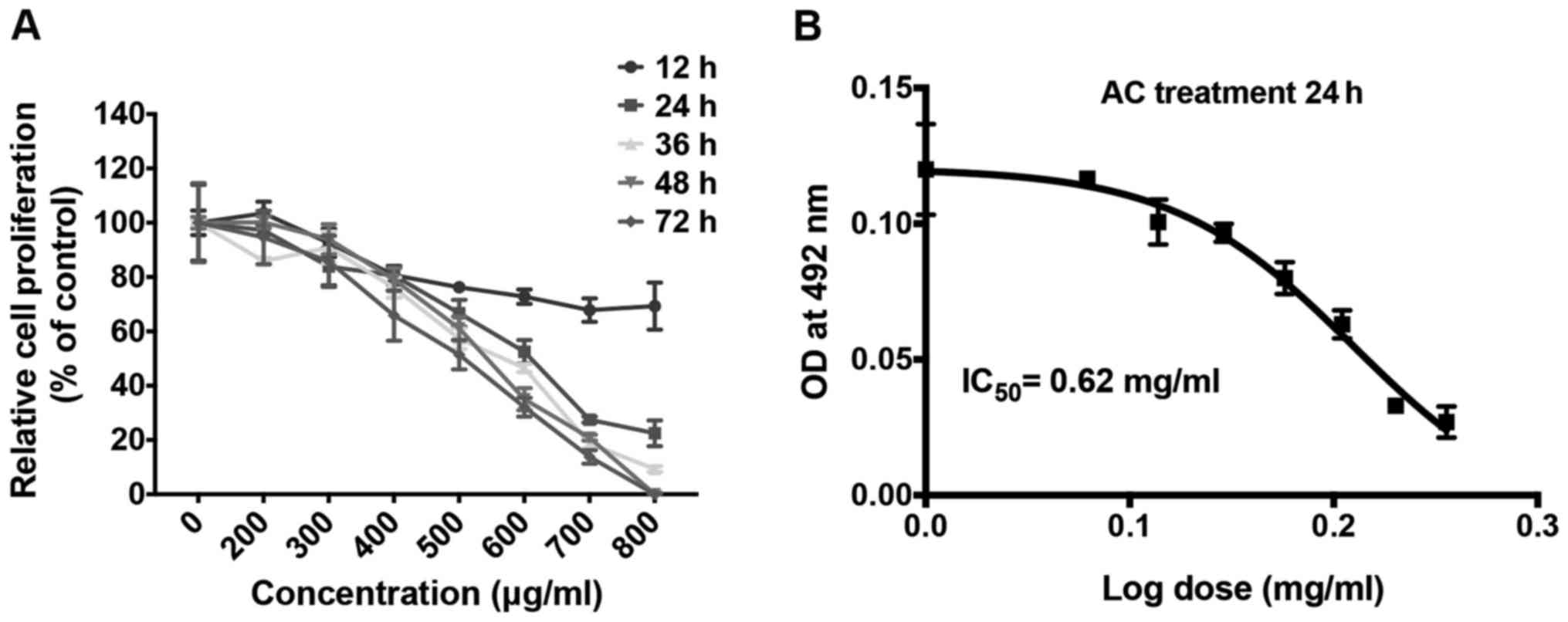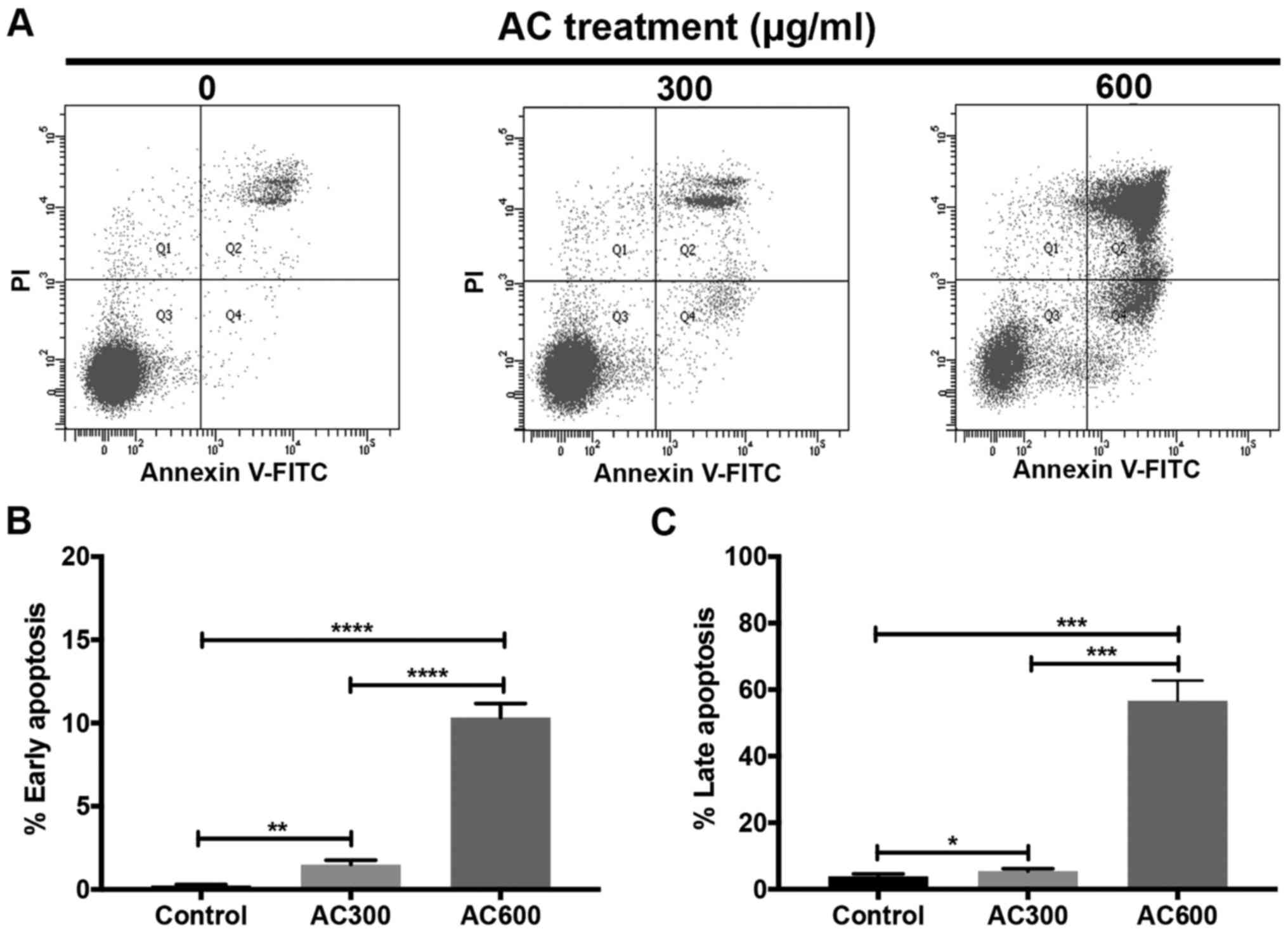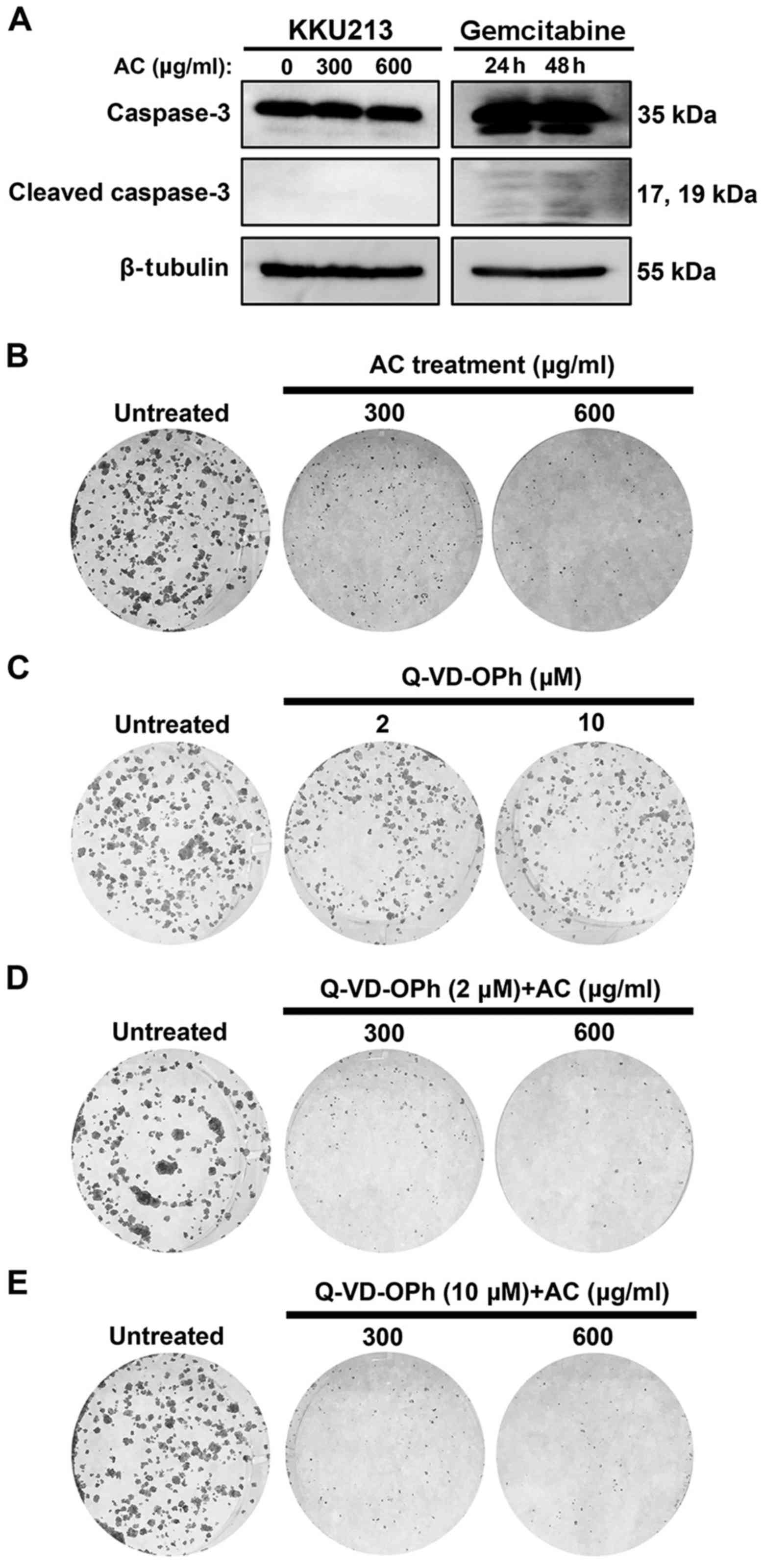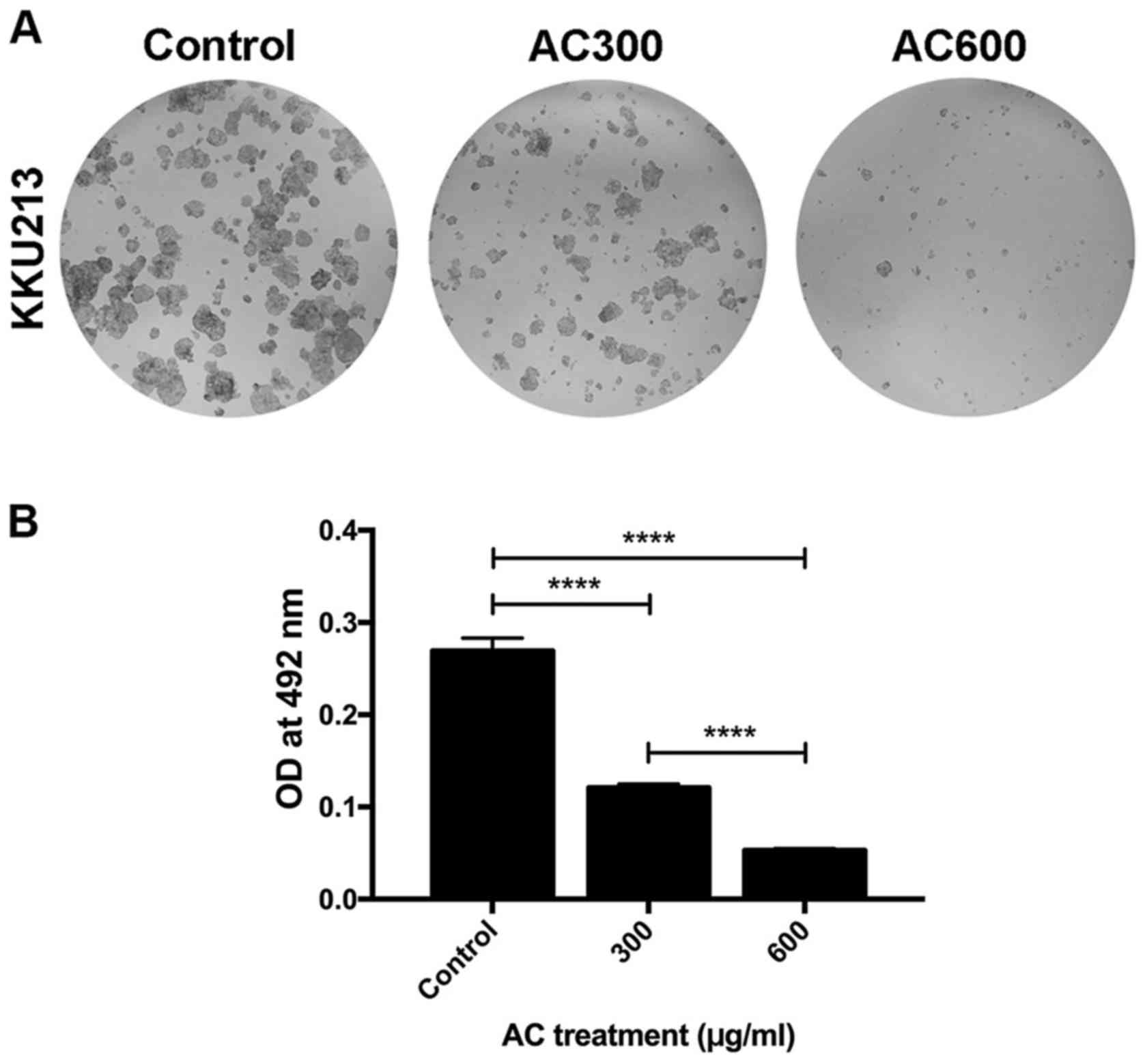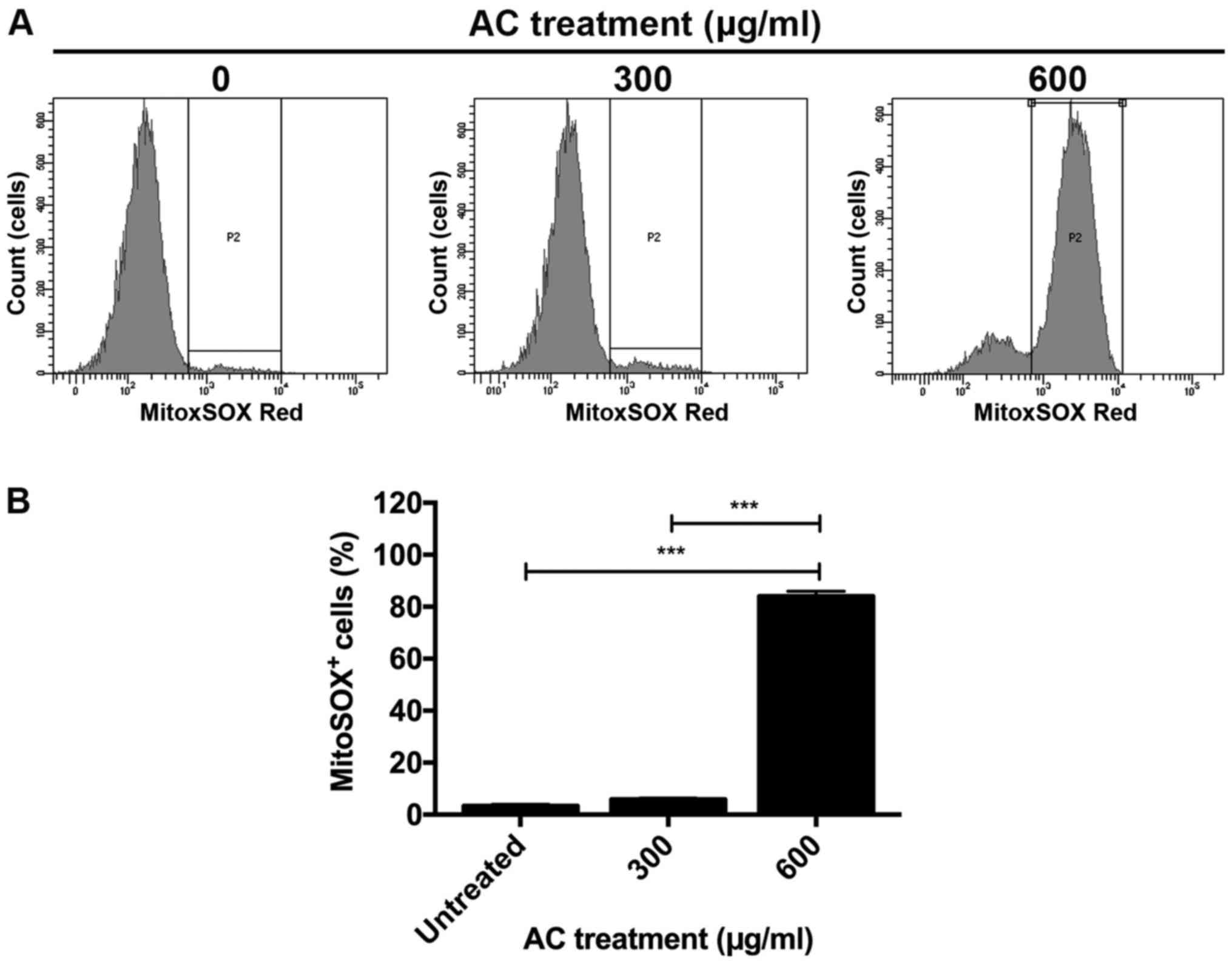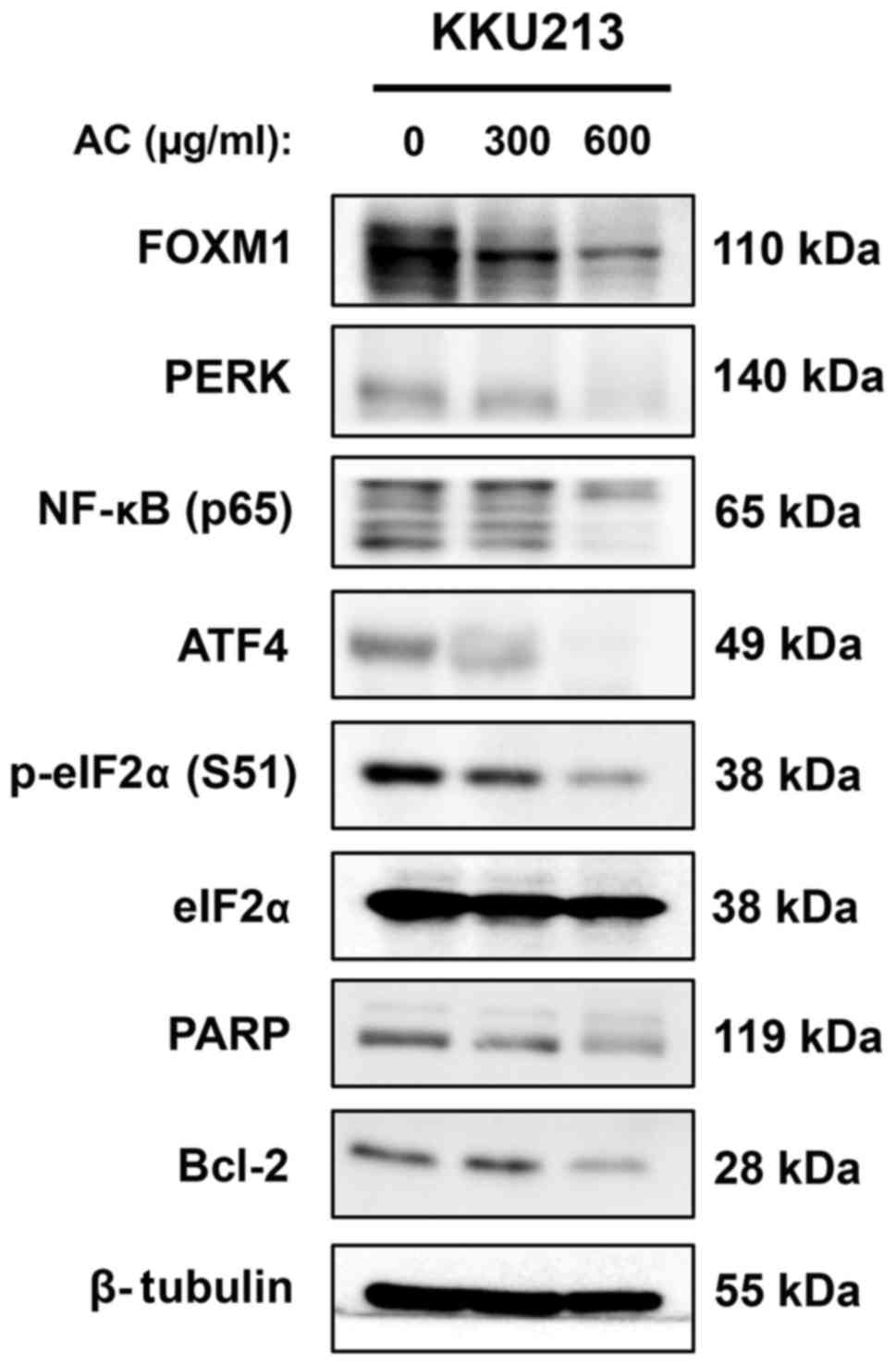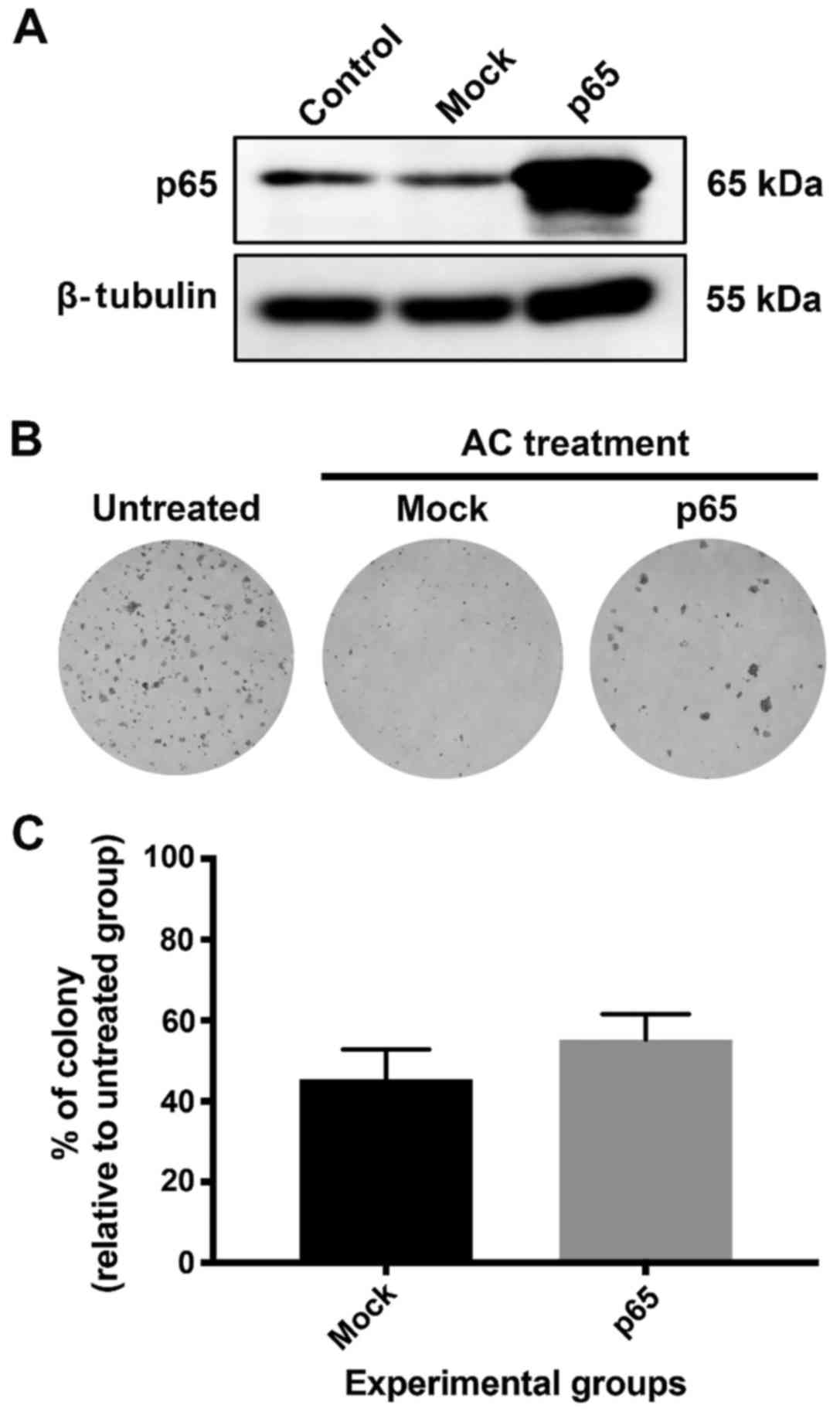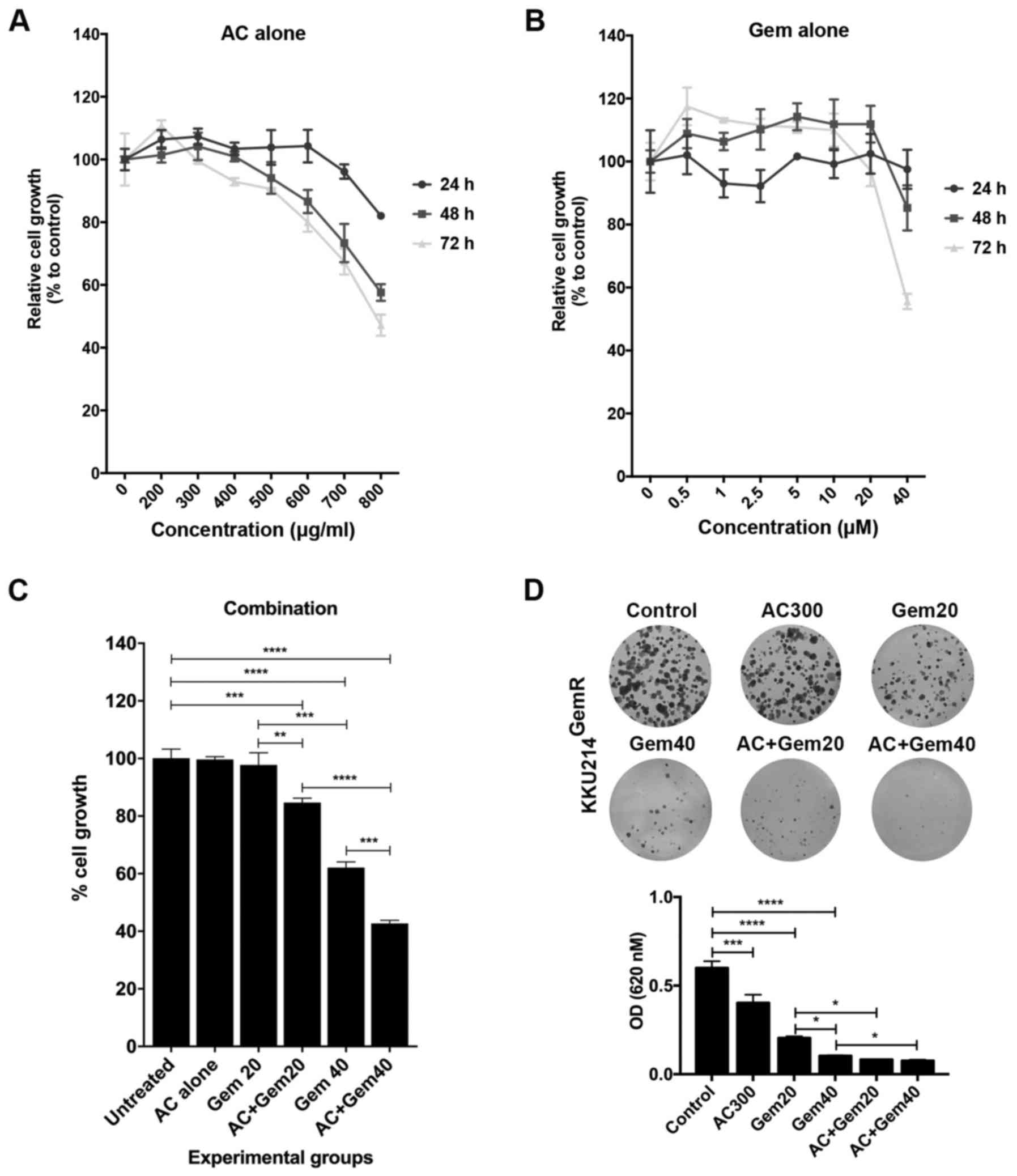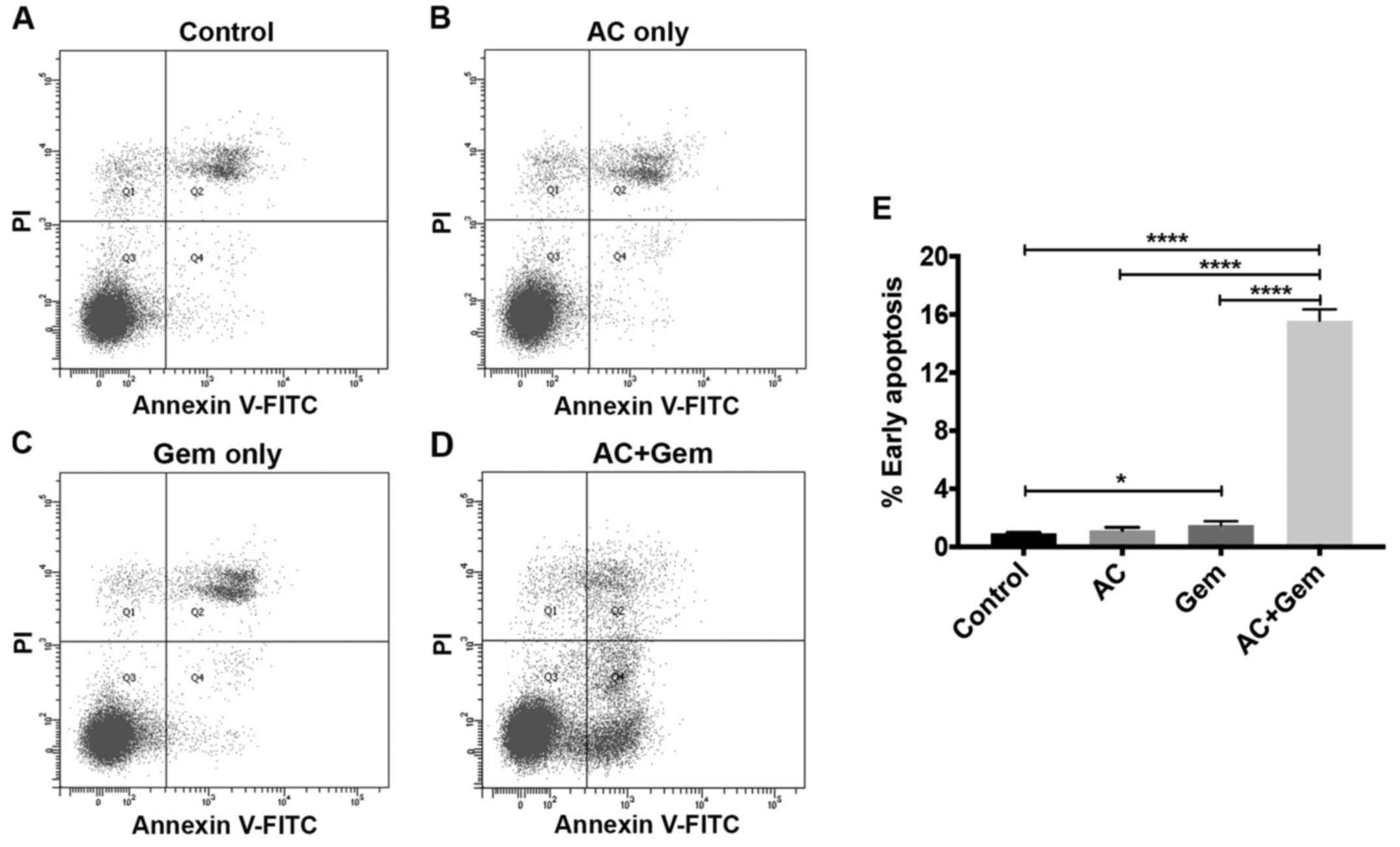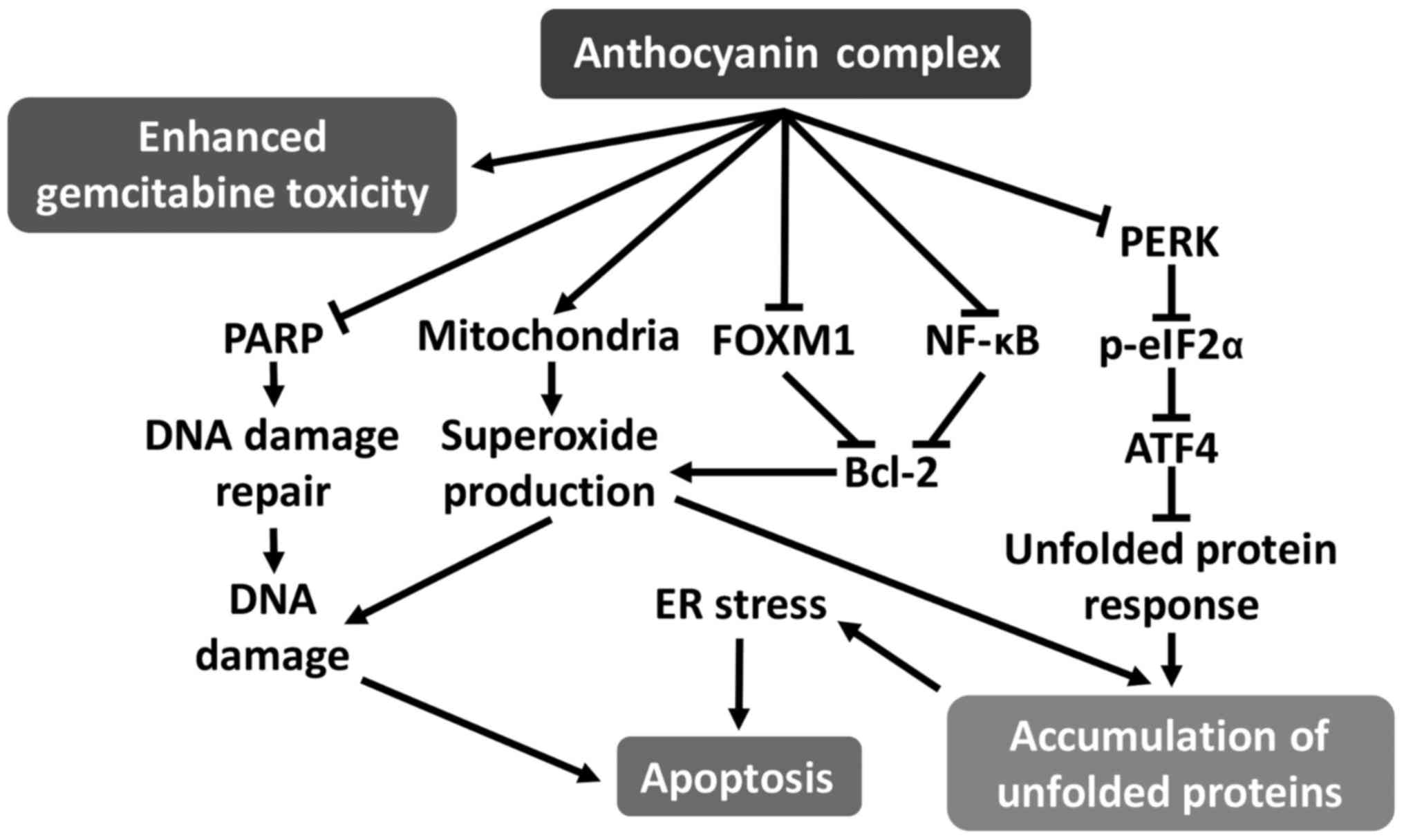|
1
|
Banales JM, Cardinale V, Carpino G,
Marzioni M, Andersen JB, Invernizzi P, Lind GE, Folseraas T, Forbes
SJ, Fouassier L, et al: Expert consensus document:
Cholangiocarcinoma: Current knowledge and future perspectives
consensus statement from the European Network for the Study of
Cholangiocarcinoma (ENS-CCA). Nat Rev Gastroenterol Hepatol.
13:261–280. 2016. View Article : Google Scholar : PubMed/NCBI
|
|
2
|
Kirstein MM and Vogel A: Epidemiology and
risk factors of cholangiocarcinoma. Visc Med. 32:395–400. 2016.
View Article : Google Scholar
|
|
3
|
Sripa B and Pairojkul C:
Cholangiocarcinoma: Lessons from Thailand. Curr Opin Gastroenterol.
24:349–356. 2008. View Article : Google Scholar : PubMed/NCBI
|
|
4
|
IARCNA: A Review of Human Carcinogens:
Opisthorchis viverrini and Clonorchis sinensis. IARC Monogr Eval
Carcinog Risks Hum. 100B:341–370. 2012.
|
|
5
|
Sripa B, Brindley PJ, Mulvenna J, Laha T,
Smout MJ, Mairiang E, Bethony JM and Loukas A: The tumorigenic
liver fluke Opisthorchis viverrini - multiple pathways to cancer.
Trends Parasitol. 28:395–407. 2012. View Article : Google Scholar : PubMed/NCBI
|
|
6
|
Prakobwong S, Pinlaor S, Yongvanit P,
Sithithaworn P, Pairojkul C and Hiraku Y: Time profiles of the
expression of metalloproteinases, tissue inhibitors of
metalloproteases, cytokines and collagens in hamsters infected with
Opisthorchis viverrini with special reference to peribiliary
fibrosis and liver injury. Int J Parasitol. 39:825–835. 2009.
View Article : Google Scholar : PubMed/NCBI
|
|
7
|
Loaharanu P and Sornmani S: Preliminary
estimates of economic impact of liver fluke infection in Thailand
and the feasibility of irradiation as a control measure. Southeast
Asian J Trop Med Public Health. 22(Suppl 22): 384–390.
1991.PubMed/NCBI
|
|
8
|
Khan SA, Davidson BR, Goldin R, Pereira
SP, Rosenberg WM, Taylor-Robinson SD, Thillainayagam AV, Thomas HC,
Thursz MR and Wasan H; British Society of Gastroenterology:
Guidelines for the diagnosis and treatment of cholangiocarcinoma:
Consensus document. Gut. 51(Suppl 6): VI1–VI9. 2002. View Article : Google Scholar : PubMed/NCBI
|
|
9
|
Anderson CD, Pinson CW, Berlin J and Chari
RS: Diagnosis and treatment of cholangiocarcinoma. Oncologist.
9:43–57. 2004. View Article : Google Scholar : PubMed/NCBI
|
|
10
|
Valle J, Wasan H, Palmer DH, Cunningham D,
Anthoney A, Maraveyas A, Madhusudan S, Iveson T, Hughes S, Pereira
SP, et al ABC-02 Trial Investigators: Cisplatin plus gemcitabine
versus gemcitabine for biliary tract cancer. N Engl J Med.
362:1273–1281. 2010. View Article : Google Scholar : PubMed/NCBI
|
|
11
|
Surh YJ: Cancer chemoprevention with
dietary phytochemicals. Nat Rev Cancer. 3:768–780. 2003. View Article : Google Scholar : PubMed/NCBI
|
|
12
|
Wang H, Khor TO, Shu L, Su ZY, Fuentes F,
Lee JH and Kong AN: Plants vs. cancer: A review on natural
phytochemicals in preventing and treating cancers and their
druggability. Anticancer Agents Med Chem. 12:1281–1305. 2012.
View Article : Google Scholar : PubMed/NCBI
|
|
13
|
Singh CK, Siddiqui IA, El-Abd S, Mukhtar H
and Ahmad N: Combination chemoprevention with grape antioxidants.
Mol Nutr Food Res. 60:1406–1415. 2016. View Article : Google Scholar : PubMed/NCBI
|
|
14
|
Castañeda-Ovando A, Pacheco-Hernández ML,
Páez-Hernández ME, Rodríguez JA and Galán-Vidal CA,
Pacheco-Hernández MdL, Páez-Hernández ME, Rodríguez JA and
Galán-Vidal CA: Chemical studies of anthocyanins: A review. Food
Chem. 113:859–871. 2009. View Article : Google Scholar
|
|
15
|
Cerletti C, De Curtis A, Bracone F, Digesù
C, Morganti AG, Iacoviello L, de Gaetano G and Donati MB: Dietary
anthocyanins and health: Data from FLORA and ATHENA EU projects. Br
J Clin Pharmacol. 83:103–106. 2017. View Article : Google Scholar :
|
|
16
|
Lin BW, Gong CC, Song HF and Cui YY:
Effects of anthocyanins on the prevention and treatment of cancer.
Br J Pharmacol. 174:1226–1243. 2017. View Article : Google Scholar
|
|
17
|
Li D, Wang P, Luo Y, Zhao M and Chen F:
Health benefits of anthocyanins and molecular mechanisms: Update
from recent decade. Crit Rev Food Sci Nutr. 57:1729–1741. 2017.
View Article : Google Scholar
|
|
18
|
Yousuf B, Gul K, Wani AA and Singh P:
Health benefits of anthocyanins and their encapsulation for
potential use in food systems: A Review. Crit Rev Food Sci Nutr.
56:2223–2230. 2016. View Article : Google Scholar
|
|
19
|
Nichenametla SN, Taruscio TG, Barney DL
and Exon JH: A review of the effects and mechanisms of
polyphenolics in cancer. Crit Rev Food Sci Nutr. 46:161–183. 2006.
View Article : Google Scholar : PubMed/NCBI
|
|
20
|
Umar Lule S and Xia W: Food phenolics,
pros and cons: A Review. Food Rev Int. 21:367–388. 2005. View Article : Google Scholar
|
|
21
|
Wang LS and Stoner GD: Anthocyanins and
their role in cancer prevention. Cancer Lett. 269:281–290. 2008.
View Article : Google Scholar : PubMed/NCBI
|
|
22
|
Yang X, Luo E, Liu X, Han B, Yu X and Peng
X: Delphinidin-3-glucoside suppresses breast carcinogenesis by
inactivating the Akt/HOTAIR signaling pathway. BMC Cancer.
16:4232016. View Article : Google Scholar : PubMed/NCBI
|
|
23
|
Chen PN, Chu SC, Chiou HL, Kuo WH, Chiang
CL and Hsieh YS: Mulberry anthocyanins, cyanidin 3-rutinoside and
cyanidin 3-glucoside, exhibited an inhibitory effect on the
migration and invasion of a human lung cancer cell line. Cancer
Lett. 235:248–259. 2006. View Article : Google Scholar
|
|
24
|
Kamei H, Kojima T, Hasegawa M, Koide T,
Umeda T, Yukawa T and Terabe K: Suppression of tumor cell growth by
anthocyanins in vitro. Cancer Invest. 13:590–594. 1995. View Article : Google Scholar : PubMed/NCBI
|
|
25
|
Eiro MJ and Heinonen M: Anthocyanin color
behavior and stability during storage: Effect of intermolecular
copigmentation. J Agric Food Chem. 50:7461–7466. 2002. View Article : Google Scholar : PubMed/NCBI
|
|
26
|
Intuyod K, Priprem A, Limphirat W,
Charoensuk L, Pinlaor P, Pairojkul C, Lertrat K and Pinlaor S:
Anti-inflammatory and anti-periductal fibrosis effects of an
anthocyanin complex in Opisthorchis viverrini-infected hamsters.
Food Chem Toxicol. 74:206–215. 2014. View Article : Google Scholar : PubMed/NCBI
|
|
27
|
Tepsiri N, Chaturat L, Sripa B, Namwat W,
Wongkham S, Bhudhisawasdi V and Tassaneeyakul W: Drug sensitivity
and drug resistance profiles of human intrahepatic
cholangiocarcinoma cell lines. World J Gastroenterol. 11:2748–2753.
2005. View Article : Google Scholar : PubMed/NCBI
|
|
28
|
Wattanawongdon W, Hahnvajanawong C, Namwat
N, Kanchanawat S, Boonmars T, Jearanaikoon P, Leelayuwat C,
Techasen A and Seubwai W: Establishment and characterization of
gemcitabine-resistant human cholangiocarcinoma cell lines with
multidrug resistance and enhanced invasiveness. Int J Oncol.
47:398–410. 2015. View Article : Google Scholar : PubMed/NCBI
|
|
29
|
Kuželová K, Grebeňová D and Brodská B:
Dose-dependent effects of the caspase inhibitor Q-VD-OPh on
different apoptosis-related processes. J Cell Biochem.
112:3334–3342. 2011. View Article : Google Scholar
|
|
30
|
Franken NA, Rodermond HM, Stap J, Haveman
J and van Bree C: Clonogenic assay of cells in vitro. Nat Protoc.
1:2315–2319. 2006. View Article : Google Scholar
|
|
31
|
Puck TT and Marcus PI: Action of x-rays on
mammalian cells. J Exp Med. 103:653–666. 1956. View Article : Google Scholar : PubMed/NCBI
|
|
32
|
Cai J and Jones DP: Superoxide in
apoptosis. Mitochondrial generation triggered by cytochrome c loss.
J Biol Chem. 273:11401–11404. 1998. View Article : Google Scholar : PubMed/NCBI
|
|
33
|
Piva R, Belardo G and Santoro MG:
NF-kappaB: A stress-regulated switch for cell survival. Antioxid
Redox Signal. 8:478–486. 2006. View Article : Google Scholar : PubMed/NCBI
|
|
34
|
Myatt SS and Lam EW: The emerging roles of
forkhead box (Fox) proteins in cancer. Nat Rev Cancer. 7:847–859.
2007. View Article : Google Scholar : PubMed/NCBI
|
|
35
|
Cao SS and Kaufman RJ: Endoplasmic
reticulum stress and oxidative stress in cell fate decision and
human disease. Antioxid Redox Signal. 21:396–413. 2014. View Article : Google Scholar : PubMed/NCBI
|
|
36
|
Holohan C, Van Schaeybroeck S, Longley DB
and Johnston PG: Cancer drug resistance: An evolving paradigm. Nat
Rev Cancer. 13:714–726. 2013. View Article : Google Scholar : PubMed/NCBI
|
|
37
|
Longo L, Platini F, Scardino A, Alabiso O,
Vasapollo G and Tessitore L: Autophagy inhibition enhances
anthocyanin-induced apoptosis in hepatocellular carcinoma. Mol
Cancer Ther. 7:2476–2485. 2008. View Article : Google Scholar : PubMed/NCBI
|
|
38
|
Neto CC, Amoroso JW and Liberty AM:
Anticancer activities of cranberry phytochemicals: An update. Mol
Nutr Food Res. 52(Suppl 1): S18–S27. 2008.PubMed/NCBI
|
|
39
|
Rugină D, Hanganu D, Diaconeasa Z, Tăbăran
F, Coman C, Leopold L, Bunea A and Pintea A: Antiproliferative and
apoptotic potential of cyanidin-based anthocyanins on melanoma
cells. Int J Mol Sci. 18:949–959. 2017. View Article : Google Scholar
|
|
40
|
Jinawath N, Chamgramol Y, Furukawa Y,
Obama K, Tsunoda T, Sripa B, Pairojkul C and Nakamura Y: Comparison
of gene expression profiles between Opisthorchis viverrini and
non-Opisthorchis viverrini associated human intrahepatic
cholangiocarcinoma. Hepatology. 44:1025–1038. 2006. View Article : Google Scholar : PubMed/NCBI
|
|
41
|
Zhang JR, Lu F, Lu T, Dong WH, Li P, Liu
N, Ma DX and Ji CY: Inactivation of FoxM1 transcription factor
contributes to curcumin-induced inhibition of survival,
angiogenesis, and chemosensitivity in acute myeloid leukemia cells.
J Mol Med (Berl). 92:1319–1330. 2014. View Article : Google Scholar
|
|
42
|
Karin M: Nuclear factor-kappaB in cancer
development and progression. Nature. 441:431–436. 2006. View Article : Google Scholar : PubMed/NCBI
|
|
43
|
Hoesel B and Schmid JA: The complexity of
NF-κB signaling in inflammation and cancer. Mol Cancer. 12:862013.
View Article : Google Scholar
|
|
44
|
Baldwin AS Jr: The NF-kappa B and I kappa
B proteins: New discoveries and insights. Annu Rev Immunol.
14:649–683. 1996. View Article : Google Scholar : PubMed/NCBI
|
|
45
|
Seubwai W, Wongkham C, Puapairoj A,
Khuntikeo N, Pugkhem A, Hahnvajanawong C, Chaiyagool J, Umezawa K,
Okada S and Wongkham S: Aberrant expression of NF-κB in liver fluke
associated cholangiocarcinoma: Implications for targeted therapy.
PLoS One. 9:e1060562014. View Article : Google Scholar
|
|
46
|
Hafeez BB, Siddiqui IA, Asim M, Malik A,
Afaq F, Adhami VM, Saleem M, Din M and Mukhtar H: A dietary
anthocyanidin delphinidin induces apoptosis of human prostate
cancer PC3 cells in vitro and in vivo: Involvement of nuclear
factor-kappaB signaling. Cancer Res. 68:8564–8572. 2008. View Article : Google Scholar : PubMed/NCBI
|
|
47
|
Hecht SS, Huang C, Stoner GD, Li J, Kenney
PM, Sturla SJ and Carmella SG: Identification of cyanidin
glycosides as constituents of freeze-dried black raspberries which
inhibit anti-benzo[a]pyrene-7,8-diol-9,10-epoxide induced NFkappaB
and AP-1 activity. Carcinogenesis. 27:1617–1626. 2006. View Article : Google Scholar : PubMed/NCBI
|
|
48
|
Kim JH, Gupta SC, Park B, Yadav VR and
Aggarwal BB: Turmeric (Curcuma longa) inhibits inflammatory nuclear
factor (NF)-κB and NF-κB-regulated gene products and induces death
receptors leading to suppressed proliferation, induced
chemo-sensitization, and suppressed osteoclastogenesis. Mol Nutr
Food Res. 56:454–465. 2012. View Article : Google Scholar
|
|
49
|
Prakobwong S, Gupta SC, Kim JH, Sung B,
Pinlaor P, Hiraku Y, Wongkham S, Sripa B, Pinlaor S and Aggarwal
BB: Curcumin suppresses proliferation and induces apoptosis in
human biliary cancer cells through modulation of multiple cell
signaling pathways. Carcinogenesis. 32:1372–1380. 2011. View Article : Google Scholar : PubMed/NCBI
|
|
50
|
Rahman MM, Ichiyanagi T, Komiyama T,
Hatano Y and Konishi T: Superoxide radical- and
peroxynitrite-scavenging activity of anthocyanins;
structure-activity relationship and their synergism. Free Radic
Res. 40:993–1002. 2006. View Article : Google Scholar : PubMed/NCBI
|
|
51
|
Kausar H, Jeyabalan J, Aqil F, Chabba D,
Sidana J, Singh IP and Gupta RC: Berry anthocyanidins
synergistically suppress growth and invasive potential of human
non-small-cell lung cancer cells. Cancer Lett. 325:54–62. 2012.
View Article : Google Scholar : PubMed/NCBI
|
|
52
|
Casanelles E, Gozzelino R,
Marqués-Fernández F, Iglesias-Guimarais V, Garcia-Belinchón M,
Sánchez-Osuna M, Solé C, Moubarak RS, Comella JX and Yuste VJ:
NF-κB activation fails to protect cells to TNFα-induced apoptosis
in the absence of Bcl-xL, but not Mcl-1, Bcl-2 or Bcl-w. Biochim
Biophys Acta. 1833:1085–1095. 2013. View Article : Google Scholar : PubMed/NCBI
|
|
53
|
Li N, Ragheb K, Lawler G, Sturgis J, Rajwa
B, Melendez JA and Robinson JP: DPI induces mitochondrial
superoxide-mediated apoptosis. Free Radic Biol Med. 34:465–477.
2003. View Article : Google Scholar : PubMed/NCBI
|
|
54
|
Kondo K, Obitsu S, Ohta S, Matsunami K,
Otsuka H and Teshima R: Poly(ADP-ribose) polymerase
(PARP)-1-independent apoptosis-inducing factor (AIF) release and
cell death are induced by eleostearic acid and blocked by
alpha-tocopherol and MEK inhibition. J Biol Chem. 285:13079–13091.
2010. View Article : Google Scholar : PubMed/NCBI
|
|
55
|
Fernald K and Kurokawa M: Evading
apoptosis in cancer. Trends Cell Biol. 23:620–633. 2013. View Article : Google Scholar : PubMed/NCBI
|
|
56
|
Mathiasen IS and Jäättelä M: Triggering
caspase-independent cell death to combat cancer. Trends Mol Med.
8:212–220. 2002. View Article : Google Scholar : PubMed/NCBI
|
|
57
|
Herceg Z and Wang ZQ: Functions of
poly(ADP-ribose) polymerase (PARP) in DNA repair, genomic integrity
and cell death. Mutat Res. 477:97–110. 2001. View Article : Google Scholar : PubMed/NCBI
|
|
58
|
Schieber M and Chandel NS: ROS function in
redox signaling and oxidative stress. Curr Biol. 24:R453–R462.
2014. View Article : Google Scholar : PubMed/NCBI
|
|
59
|
Dizdaroglu M, Jaruga P, Birincioglu M and
Rodriguez H: Free radical-induced damage to DNA: Mechanisms and
measurement. Free Radic Biol Med. 32:1102–1115. 2002. View Article : Google Scholar : PubMed/NCBI
|
|
60
|
Borges HL, Linden R and Wang JY: DNA
damage-induced cell death: Lessons from the central nervous system.
Cell Res. 18:17–26. 2008. View Article : Google Scholar
|
|
61
|
Murphy MP: How mitochondria produce
reactive oxygen species. Biochem J. 417:1–13. 2009. View Article : Google Scholar
|
|
62
|
Higa A and Chevet E: Redox signaling loops
in the unfolded protein response. Cell Signal. 24:1548–1555. 2012.
View Article : Google Scholar : PubMed/NCBI
|
|
63
|
Schröder M and Kaufman RJ: ER stress and
the unfolded protein response. Mutat Res. 569:29–63. 2005.
View Article : Google Scholar
|
|
64
|
Xu C, Bailly-Maitre B and Reed JC:
Endoplasmic reticulum stress: Cell life and death decisions. J Clin
Invest. 115:2656–2664. 2005. View Article : Google Scholar : PubMed/NCBI
|
|
65
|
Ron D: Translational control in the
endoplasmic reticulum stress response. J Clin Invest.
110:1383–1388. 2002. View Article : Google Scholar : PubMed/NCBI
|
|
66
|
Shi Y, Vattem KM, Sood R, An J, Liang J,
Stramm L and Wek RC: Identification and characterization of
pancreatic eukaryotic initiation factor 2 alpha-subunit kinase,
PEK, involved in translational control. Mol Cell Biol.
18:7499–7509. 1998. View Article : Google Scholar : PubMed/NCBI
|
|
67
|
Harding HP, Novoa I, Zhang Y, Zeng H, Wek
R, Schapira M and Ron D: Regulated translation initiation controls
stress-induced gene expression in mammalian cells. Mol Cell.
6:1099–1108. 2000. View Article : Google Scholar : PubMed/NCBI
|
|
68
|
Scheuner D, Song B, McEwen E, Liu C,
Laybutt R, Gillespie P, Saunders T, Bonner-Weir S and Kaufman RJ:
Translational control is required for the unfolded protein response
and in vivo glucose homeostasis. Mol Cell. 7:1165–1176. 2001.
View Article : Google Scholar : PubMed/NCBI
|
|
69
|
Harding HP, Zhang Y, Bertolotti A, Zeng H
and Ron D: Perk is essential for translational regulation and cell
survival during the unfolded protein response. Mol Cell. 5:897–904.
2000. View Article : Google Scholar : PubMed/NCBI
|
|
70
|
Rajesh K, Krishnamoorthy J, Kazimierczak
U, Tenkerian C, Papadakis AI, Wang S, Huang S and Koromilas AE:
Phosphorylation of the translation initiation factor eIF2α at
serine 51 determines the cell fate decisions of Akt in response to
oxidative stress. Cell Death Dis. 6:e15912015. View Article : Google Scholar
|
|
71
|
Thummayot S, Tocharus C, Suksamrarn A and
Tocharus J: Neuroprotective effects of cyanidin against Aβ-induced
oxidative and ER stress in SK-N-SH cells. Neurochem Int. 101:15–21.
2016. View Article : Google Scholar : PubMed/NCBI
|
|
72
|
Garg AK, Buchholz TA and Aggarwal BB:
Chemosensitization and radiosensitization of tumors by plant
polyphenols. Antioxid Redox Signal. 7:1630–1647. 2005. View Article : Google Scholar : PubMed/NCBI
|















